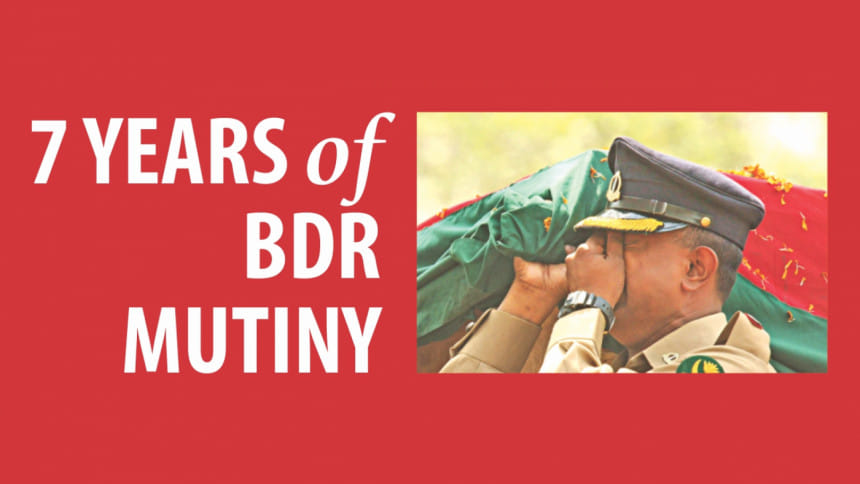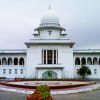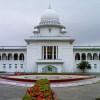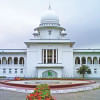Now wait for HC verdict

The High Court is likely to finish hearing the death reference and appeals in BDR carnage case in May this year, as it has already completed majority of their proceedings in the last 190 working days.
On completion of the hearings, the court will fix a date for delivering verdict on the biggest ever criminal case in the country's history in terms of the number of accused and convicts.
After the verdict, it may take some time for writing and releasing the full verdict and then both the state and defence may move appeals before the Appellate Division of the Supreme Court, if they want to.
“The apex court will then hear and dispose of the appeals and it may take three more years to deliver the final judgment of the case even if the proceedings are run on priority basis,” said defence counsel Aminul Islam.
The death reference and the appeals were filed with the HC months after a Dhaka court announced its verdict on November 5, 2013, nearly five years after the mutiny at the Pilkhana BDR headquarters.
The trial court awarded death penalty to 150 soldiers of the erstwhile Bangladesh Rifles (BDR) and two civilians, and sentenced 161 others to life imprisonment for their roles and involvement in the carnage.
It also handed down rigorous imprisonment, ranging from three to 10 years, to 256 people, mostly BDR soldiers. The court acquitted 277 accused. A total of 846 people, 823 of them BDR personnel, were on trial.
Seventy four people, including 57 senior and mid-ranking army officials, were massacred in the BDR mutiny on February 25-26 in 2009 at the Pilkhana headquarters of the paramilitary force that has been renamed Border Guard Bangladesh (BGB).
Until February 18 this year, both the state and defence counsels have placed arguments on factual points of the appeals of 118 death-row inmates out of total 152 of the case before the HC.
After placing arguments on factual points of the appeals of the rest death-row inmates, the counsels would make arguments on factual points of the appeals of other convicts who were convicted and sentenced to life imprisonment and different terms of imprisonments, Deputy Attorney General AKM Zahid Sarwar Kazal and defence counsel Aminul Islam told The Daily Star on February 18.
The High Court would hear legal points after the counsels finished placing arguments on the factual points, they said, adding that the hearing proceedings might be completed in May this year.
Aminul Islam said after the High Court announces the judgment, it might take time for writing and releasing the full verdict and then both the state and defence might move appeals before the Appellate Division, challenging the HC verdict.
Earlier, the state counsels presented first information report, charge sheet, confessional statements of 538 convicted accused, statements on the seizure list, statements of 654 prosecution witnesses and 29 defence witnesses of the case before the HC.
The special HC bench comprising Justice Md Shawkat Hossain, Justice Md Abu Zafor Siddique, and Justice Nazrul Islam Talukder on January 18 last year started hearing death reference and 255 appeals in the case, paving the way for completing its adjudication.
The 33-hour mutiny broke out after the then BDR chief Maj Gen Shakil Ahmed started a Darbar (Grand Conference) at the Darbar Hall in Pilkhana in the morning of February 25, 2009.
The mutineers looted the armoury and rampaged through the Pilkhana headquarters. Within hours, they killed most of the superior officers in and around the Darbar hall.
They tortured and bayoneted their superiors before killing them, and then dumped the bodies in sewers and mass graves to destroy evidence.
The mutineers also tortured the family members of their superiors and looted their houses. They also ransacked officers' quarters and set fire to vehicles.
Earlier, 17,306 BDR jawans faced trial in 11 special BDR courts and 60 summery trial courts of BDR commanding officers for the mutiny.
At least 78 accused jawans died under mysterious circumstances after the mutiny. Many of them reportedly died of heart attack in police custody while a few others committed suicide.

 For all latest news, follow The Daily Star's Google News channel.
For all latest news, follow The Daily Star's Google News channel. 








Comments